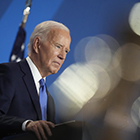
Mamdani’s Digital Machine
The success of Zohran’s agenda will depend on an ambitious digital strategy that transcends social media performance.


The success of Zohran’s agenda will depend on an ambitious digital strategy that transcends social media performance.

A roundtable on the 2024 election.
It’s easy to come up with plans for remaking society. It’s much harder to work alongside ordinary people to build coalitions that can change the rules of the game.

Biden claims he is remaining in the race because the threat of Trump is too great. That’s the exact reason he should consider retiring.

The U.S. climate movement has largely grown in response to setbacks and defeats. What will it do in the face of an underwhelming victory?

Grassroots groups can help elected officials resist the pressures of mainstream political culture.

Democratic socialism offers a vision of a good life—that we can share wealth and power and knowledge, be less selfish and cruel, and let everyone, not just the lucky few, develop their talents.

Throughout the United States, racial separation remains a common feature of collective life. The consequences are significant for left political organizing aimed at building a multiracial working-class majority.

If there’s a chance to make a better world, our best shot comes from building a working-class majority.

The politics of the 2010s and 2020s are about who the people are and what it means for them to matter.

An interview with Senator Bernie Sanders’ foreign policy advisor Matt Duss.

If there’s a lesson to be derived from Gary Dorrien’s account of American socialism, it’s that the movement’s open participation in and with the broad democratic left benefits the socialist cause.

What connection does the party of Thomas Jefferson and Andrew Jackson have to the party of Barack Obama and Kamala Harris?

In The Great Recoil, Paolo Gerbaudo argues that the left needs to speak to people’s fears and connect them to hope.

The results of the 2020 Democratic primaries suggest the limits of a left strategy for power starting at, rather than building toward, the presidency.